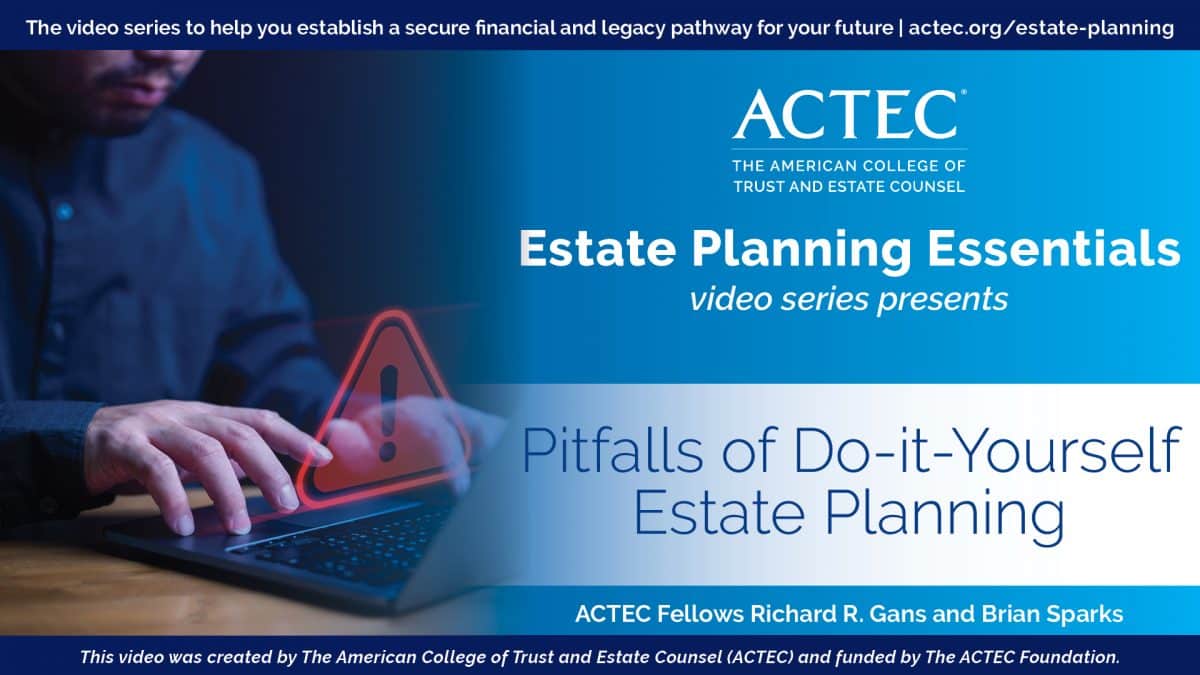Artificial Intelligence (AI) can play a crucial role in tasks such as wealth forecasting, tax optimization, and personalized financial advice. These technology tools can help streamline the estate planning process by automating routine tasks, ensuring compliance with legal requirements, and providing real-time updates on changes in financial landscapes—but there are risks.
ACTEC Fellows Professor Gerry W. Beyer and Jean Gordon Carter explain what consumers need to understand and list questions to ask their estate planning attorney, who may be using this new technology.
Resources
Transcript
Good day, I’m Jean Carter, an ACTEC Fellow from Raleigh, North Carolina, and with me is Professor Gerry Beyer, an ACTEC Academic Fellow from Texas. Gerry is the Governor Preston E. Smith Regents Professor of Law at the Texas Tech University School of Law, and our topic today is Artificial Intelligence and Planning Your Estate.
Gerry, what do we mean when we talk about artificial intelligence?
Understanding Types of Artificial Intelligence (AI)
Prof. Gerry Beyer: Artificial intelligence refers to computers that use sophisticated algorithms to complete tasks, and even learn to enhance their performance accuracy. There are four types of AI. The first is one you’re very familiar with; it’s called Reactive AI. It provides predictable outcomes based on the input; it doesn’t really learn. That’s like the predictive way that it handles when you type texts and emails and documents, where it suggests the next words that you use.
The AI that we’re focusing on is Limited Memory or Generative AI, which learns as it receives more data after being trained on a specific set of data, as well as receiving new information from user-entered data or perhaps from the Internet. There are two other kinds of AI. They’re more like the science-fiction types, where the AI is actually self-aware and sentient, but that is a long way in the future.
Now, the Limited Memory or Generative AI that we’re focusing on has really been around since the 1950s. But recently, it has become a big issue because the amount of information it can access, the memory that it has, is so much greater than in the past, having billions of data points that it can rely on.
Jean Carter: Gerry, this is fascinating—and maybe a little scary. But tell me, how can my attorney use artificial intelligence while working on my estate plan?
Uses of AI in an Estate Plan
Prof. Gerry Beyer: The attorney is going to be able to use AI to prepare documents faster and with greater accuracy. So, they’ll be able to prepare drafts of wills, trusts, powers of attorney, and other estate planning documents quicker and with greater accuracy. AI will also help with communications with you when difficult legal concepts may need to be explained, and it will help prepare documents that need to be filed with the court, financial institutions, or other entities. And if you’re doing an estate or trust administration, it will assist in making sure all the deadlines are met and all the proper notices are sent out.
Jean Carter: So what should I expect from my lawyer if he is using AI in doing my work?
Expectations of a Lawyer Who Is Preparing Your Estate Plan
Competency
Prof. Gerry Beyer: The first thing you want to expect is competency. Our professional conduct rules require that attorneys be aware of the benefits and risks associated with relevant technology, which would include AI. So, your attorney needs to know that the AI does not think, it does not feel, and it cannot evaluate truth or falsehood. It is merely a very sophisticated guessing machine that provides responses based on correlating billions of data points.
Because of that, AI is capable of making up responses or, as we call it, hallucinating. You may have heard of the recent case of Steven Schwartz, who used ChatGPT to find case law to support his position and used it in briefs to the court. It was later found out that the case names, citations, and quotes did not exist, and he and his firm were sanctioned over $5,000.
So, your attorney should need to know, and you should expect them to carefully check, anything that the AI helps the attorney generate.
Confidentiality
Next, expect confidentiality, because the AIs remember whatever information the attorney gives them. Either the attorney is going to only use very generic information when giving it to the AI, or perhaps will have a more sophisticated system where the attorney can guarantee that your personal data never leaves the attorney’s control.
Disclosure of AI in the Engagement Letter
The attorney should also disclose to you in the engagement letter, that is, the contract that you signed, that he or she will be using AI. And if the attorney doesn’t discuss AI with you, don’t be afraid to ask. Just come right out and ask, “How is AI going to be used?”
Supervision of Staff When Using AI
And the last thing you should expect is that the attorney is going to carefully supervise their staff from all levels, from secretaries, paralegals, associates, and even the senior partner, to be sure that everyone in the firm is using AI properly.
Jean Carter: Gerry, with all of the artificial intelligence out there, why can’t I just do my estate plan by myself using AI?
Using AI to Create Estate Documents
Prof. Gerry Beyer: Well, you could do it. There are many websites that promise to generate your estate planning documents for a very nominal cost. And you could theoretically do that to create your estate plan. But you know, is that a good idea?
Jean Carter: It doesn’t sound like a good idea. I think it’s probably a bad idea, right?
Prof. Gerry Beyer: You are absolutely right. If you work with a human estate planning attorney, you’ll get personal attention, personal advice, and customized provisions beyond anything that AIs can create. Human attorneys recognize the potential of contests or other problems with your estate plan, take appropriate steps, and use all of your personal feelings and desires to create the exact estate plan you like. I get emails and phone calls virtually every day from attorneys and probate judges who are trying to sort out how to handle the estates of people who tried to be their own lawyers. The cost of straightening out can be enormous compared to the cost of doing it right in the first place. The time delay can be significant, and the person’s intent gets frustrated.
It’s just like, you could go on the Internet, look at YouTube, get some videos on how to do operations to remove your appendix, and do it—but I never would recommend it. You don’t want to do that. Same thing with planning your estate using AI by yourself. Because there is no substitute for the personal attention and skill an attorney can provide in planning your estate, the care for your family members after you die, and how your finances and healthcare decisions should be handled if you become incapacitated. However, the attorney’s use of AI will make that process smoother, more efficient, and perhaps even less costly for you.
Jean Carter: Well, Gerry, this has been fascinating. Thank you for sharing this information on artificial intelligence and planning our estates.
Prof. Gerry Beyer: You’re very welcome. It was great to be here.
Featured Video
Pitfalls of Do-It-Yourself Estate Planning
A discussion of what consumers need to know about using do-it-yourself estate planning documents and DIY wills.
ACTEC Estate Planning Essentials

ACTEC Fellows provide answers to frequently asked trust and estate planning questions in this video series.



